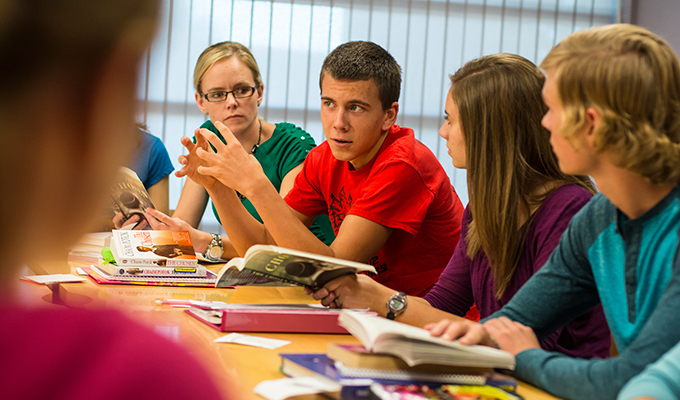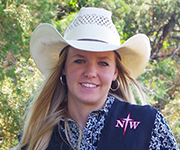Learning in Community
Common course introduces first-year students to college and God’s call
by Anita Cirulis

DOUG BURG
The small size of First-Year Seminar classes—no more than 16 students per section—encourages deep discussions and close friendships.
Jesus said the first and greatest commandment is to love God with all one’s heart and soul and mind, and the second is like it: to love one’s neighbor as oneself. But what does that look like in daily life? More pointedly for Northwestern students, how do those commands impact their college education?
The First-Year Seminar (FYS), a new course at NWC, introduces students to a Christian academic community as they explore the answers to those questions.
Haley Chambers was one of 117 freshmen who took the class during its pilot year in fall 2012. Reflecting on what she learned, she wrote in her final paper, “God is using [me] to redeem the world someway, somehow. I am a Christian first and foremost ... I am [also] a student who is learning more about the creation, adding more ways to love God to my repertoire.”
Chambers’ perspective mirrors the goals professors have for the First-Year Seminar. The course is an introduction to college, the Christian liberal arts, Northwestern and Reformed theology.
“Who are my neighbors? My perspective on this issue was pretty narrow before this class ... Now I realize my neighbors are all around the world.” Ryan Kliegl
“It’s easy to think of all college students as 20-something adults,” says Dr. Mitch Kinsinger, a professor of religion and youth ministry at NWC. “But when you think about students who just graduated from high school three months earlier, how are you going to treat them, educate them, teach them?”
Northwestern’s answer, the First-Year Seminar, features small classes of no more than 16 students who initially meet during orientation prior to the start of the semester. The course itself involves extensive reading, class discussion, writing and speaking focused on four questions that reflect the two great commandments of Matthew 22: Who am I? Where am I? Who are my neighbors? and How will I live in the world?
“These seem to be the questions that someone who is 18 or 19 years old most needs to wrestle with,” says Dr. Michael Kensak, English, who played a lead role in the development of the course. “They’re timely questions, and that’s what a First-Year Seminar is: It’s an introduction to the college, addressed to a specific audience of people in one of life’s biggest transitions.”
The First-Year Seminar is the foundational course of Northwestern’s new Integrative General Education (IGE) program, which took effect this fall. The core of classes required of all students by IGE will eventually include a senior-year capstone seminar as well.
First-year seminars are the norm in higher education—more than 95 percent of colleges offer them. They can vary, however, from one-credit extensions of orientation to four-credit courses in which each professor chooses his or her own topic. Northwestern’s faculty were resolute about wanting a first-year seminar that was academically rigorous; those involved in the pilot program agreed to make it a common experience as well. Though taught by different professors, each Northwestern FYS section has the same syllabus, textbooks and assignments.
“I love this idea, because we regain something we lost when the canon in English literature exploded: a common experience and a common academic language,” says Kensak.
“I think that’s a real strength of our program,” agrees Kinsinger, who taught a First-Year Seminar last year and often finds himself referencing FYS content in his religion classes. “It’s a structural example of integration. We’re writing, speaking and thinking about the Christian liberal arts. That’s hard work, but you’ve got to model that for students. You can’t just say, ‘Here’s a whole bunch of pieces. Now you go run along and put it all together.’”
Early indications are that the First-Year Seminar is achieving its goals. Students in the pilot were tested prior to the beginning of the course on their understanding of concepts such as the liberal arts and Reformed theology. After half a semester of readings and discussions, they were tested again. “All of a sudden we had a group of students who know why Northwestern is special and what they are paying for,” Kensak says. “They know the vision of this place.”
“I thought I would be comfortable away from home, but I wasn’t. First- Year Seminar helped me to cope, and I feel like it was my second home.” Elizabeth Jacobo
Perhaps that’s why the freshman-to-sophomore retention rate for students in the pilot was 94 percent, compared to just under 91 percent for non-FYS students. National research shows increased retention is a common result of first-year programs and that participants are 5 to 15 percent more likely than nonparticipants to graduate within four years. Studies also show that students in first-year seminars report more frequent and meaningful interactions with faculty and other students and are more satisfied with their college experience.
In fact, those interactions may be the most valuable aspect of the First-Year Seminar.
“Students tell us they love the discussion,” Kensak says. “They get to wrestle with issues of identity and purpose, and we’ve given them rich, meaty texts to help them think.”
“Friendships are built in that class that are unlikely to have been built otherwise,” says English professor Kim Van Es, who is in her second year of teaching FYS. “I like that a community is formed around learning.”
Van Es is confident that conversations begun in class are continuing in the cafeteria and dorms. “They’ll say, ‘We were talking about this book last night,’” she says. “Now the great majority of our first-year students are reading the same books and working on the same assignments, so that dialogue is going to happen. You talk about things you have in common.”
“FYS is the first class that I have taken where I can openly talk about my faith daily. So many times my heart was filled with joy by the conversations that we had in class because we connected what we were doing in our assignments with our faith.” Andrew Powell
Faculty, too, are talking. Initially, seven from different disciplines were involved in creating the First-Year Seminar, sharing perspectives unique to their fields as they collaborated.
“It was incredibly energizing to learn about writing from the writing people and for them to talk to me about theological perspectives and implications,” says Kinsinger. “We were doing the work of integration.”
This year 17 professors—from the departments of biology, English, political science, psychology and theatre—are teaching the various sections of the First-Year Seminar. They continue to meet weekly to discuss their experiences and share ideas. Among them is Dr. Keith Fynaardt, who wasn’t originally on board with the idea of teaching a course outside his English literature specialty but now serves as the First-Year Seminar coordinator.
“I was skeptical at first,” he admits. “College professors aren’t trained to be team players. We carve out a little niche and that’s our role in higher education. But, I, like so many others, saw the value of the course institutionally. The goals we have—the collegiality and the communal aspect of teaching together—that’s what won me over.”
Fynaardt isn’t alone. Whether one is teacher or student, the answers to life’s biggest questions are more easily found together. The best learning takes place in community. 
What They’re Reading
In addition to a writing and research handbook, the Belhar Confession, and a guide to public speaking, reading assignments for the First-Year Seminar include a variety of nontraditional texts drawn from literature, science, theology and theatre:
 The Glass Castle, a memoir by Jeannette Walls, tells her story of growing up in a family that was wildly dysfunctional—but also made her the captivating storyteller and successful author she is today. Reading about Walls’ unconventional childhood prompts students to talk about their own families and the impact upbringing has on one’s identity.
The Glass Castle, a memoir by Jeannette Walls, tells her story of growing up in a family that was wildly dysfunctional—but also made her the captivating storyteller and successful author she is today. Reading about Walls’ unconventional childhood prompts students to talk about their own families and the impact upbringing has on one’s identity.
 Why College Matters to God, by Rick Ostrander, introduces students to the aims and purposes of a Christian college education: “[not] simply to hand you a complete Christian worldview on a platter; rather … to start you on the process of developing a comprehensive, coherent, yet dynamic Christian worldview [of your own].” Students end FYS with a better understanding of what their next three-and-a-half years should lead to.
Why College Matters to God, by Rick Ostrander, introduces students to the aims and purposes of a Christian college education: “[not] simply to hand you a complete Christian worldview on a platter; rather … to start you on the process of developing a comprehensive, coherent, yet dynamic Christian worldview [of your own].” Students end FYS with a better understanding of what their next three-and-a-half years should lead to.
“Before reading Ghost Map, I was stuck in a miasmic worldview. I did not seek the truth but assumed everything I thought was true.” Sarah Morren
 The Ghost Map is a nonfiction account of how a physician and a clergyman put their heads together and finally solved the most pressing medical riddle of their time: London’s 1854 cholera epidemic. The book reads like a mystery, and students are able to see how integrating disciplines—in this case science and sociology—lead to better answers than either could achieve on its own.
The Ghost Map is a nonfiction account of how a physician and a clergyman put their heads together and finally solved the most pressing medical riddle of their time: London’s 1854 cholera epidemic. The book reads like a mystery, and students are able to see how integrating disciplines—in this case science and sociology—lead to better answers than either could achieve on its own.
 Chaim Potok’s novel, The Chosen, explores divisions among friends, within families and between faiths in a coming-of-age story set in the New York Jewish community during World War II. It’s a rich resource for discussions about the roles culture, relationships and choice play in shaping who we become.
Chaim Potok’s novel, The Chosen, explores divisions among friends, within families and between faiths in a coming-of-age story set in the New York Jewish community during World War II. It’s a rich resource for discussions about the roles culture, relationships and choice play in shaping who we become.
 The play Clybourne Park continues the story of the Chicago home featured in the iconic 1959 drama, A Raisin in the Sun, about an African-American family moving into a white neighborhood. In Clybourne Park, a white family is moving into a black neighborhood. Students wrestle with topics that include white flight, urban renewal, multiculturalism, and what it truly means to be a good neighbor.
The play Clybourne Park continues the story of the Chicago home featured in the iconic 1959 drama, A Raisin in the Sun, about an African-American family moving into a white neighborhood. In Clybourne Park, a white family is moving into a black neighborhood. Students wrestle with topics that include white flight, urban renewal, multiculturalism, and what it truly means to be a good neighbor.
 Northwestern launches the First-Year Seminar, a course
designed to help freshmen adjust to college, connect with
each other, and discover their role in God’s world.
Northwestern launches the First-Year Seminar, a course
designed to help freshmen adjust to college, connect with
each other, and discover their role in God’s world. A new grand entrance was among the capital projects funded by the Imagine Campaign, which raised $48 million to transform student learning on and off campus.
A new grand entrance was among the capital projects funded by the Imagine Campaign, which raised $48 million to transform student learning on and off campus. Cowgirl Erin Van Horn is Northwestern’s one-woman rodeo team.
Cowgirl Erin Van Horn is Northwestern’s one-woman rodeo team.
Classic Comments
All comments are moderated and need approval from the moderator before they are posted. Comments that include profanity, or personal attacks, or antisocial behavior such as "spamming" or other inappropriate comments or material will be removed from the site. We will take steps to block users who violate any of our terms of use. You are fully responsible for the content that you post. Comments posted do not reflect the views or values of Northwestern College.